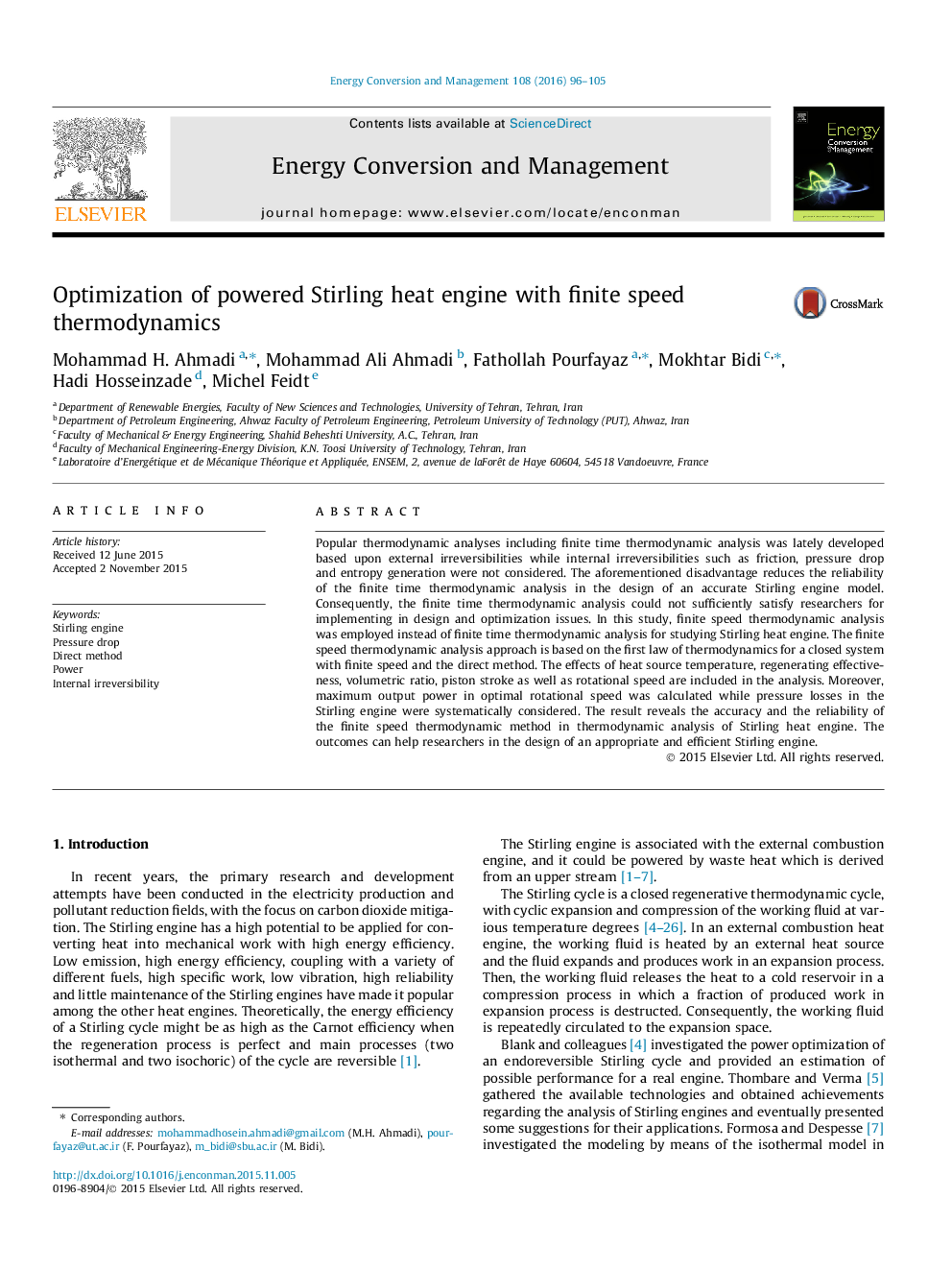| کد مقاله | کد نشریه | سال انتشار | مقاله انگلیسی | نسخه تمام متن |
|---|---|---|---|---|
| 7161407 | 1462854 | 2016 | 10 صفحه PDF | دانلود رایگان |
عنوان انگلیسی مقاله ISI
Optimization of powered Stirling heat engine with finite speed thermodynamics
ترجمه فارسی عنوان
بهینه سازی موتور گرمایشی استرلینگ با ترمودینامیک سرعت محدود
دانلود مقاله + سفارش ترجمه
دانلود مقاله ISI انگلیسی
رایگان برای ایرانیان
کلمات کلیدی
موتور استرلینگ، افت فشار، روش مستقیم، قدرت، بی ثباتی داخلی،
ترجمه چکیده
تجزیه و تحلیل های ترمودینامیکی محبوب از جمله تجزیه و تحلیل زمان محدود ترمودینامیکی به تازگی بر اساس عدم تغییرات خارجی توسعه یافته در حالی که غیر قابل برگشت داخلی مانند اصطکاک، افت فشار و تولید آنتروپی در نظر گرفته نشده است. معایب فوق الذکر، پایایی زمان تحلیلی ترمودینامیکی محدود در طراحی مدل دقیق موتور استرلینگ را کاهش می دهد. در نتیجه، تجزیه و تحلیل ترمودینامیکی زمان محدود نمی تواند به اندازه کافی محققان را برای اجرای در مسائل طراحی و بهینه سازی رضایت بخش کند. در این مطالعه، به جای آنالیز ترمودینامیکی زمان محدود برای مطالعه موتور حرارتی استرلینگ، تحلیلی ترمودینامیکی با سرعت محدود استفاده شد. رویکرد تحلیلی ترمودینامیکی سرعت محدود بر اساس قانون اول ترمودینامیک برای سیستم بسته با سرعت محدود و روش مستقیم است. اثرات دمای منبع حرارت، اثرات بازسازی، نسبت حجمی، سکته مغزی پیستون و سرعت چرخش در تجزیه و تحلیل وجود دارد. علاوه بر این، حداکثر توان خروجی در سرعت چرخش مطلوب محاسبه شد، در حالی که تلفات فشار در موتور استرلینگ به طور سیستماتیک در نظر گرفته شد. در نتیجه، دقت و قابلیت اطمینان روش ترمودینامیکی سرعت محدود در تجزیه و تحلیل ترمودینامیکی موتور حرارتی استریل را نشان می دهد. نتایج می تواند به محققان در طراحی موتور مناسب و کارآمد استرلینگ کمک کند.
موضوعات مرتبط
مهندسی و علوم پایه
مهندسی انرژی
انرژی (عمومی)
چکیده انگلیسی
Popular thermodynamic analyses including finite time thermodynamic analysis was lately developed based upon external irreversibilities while internal irreversibilities such as friction, pressure drop and entropy generation were not considered. The aforementioned disadvantage reduces the reliability of the finite time thermodynamic analysis in the design of an accurate Stirling engine model. Consequently, the finite time thermodynamic analysis could not sufficiently satisfy researchers for implementing in design and optimization issues. In this study, finite speed thermodynamic analysis was employed instead of finite time thermodynamic analysis for studying Stirling heat engine. The finite speed thermodynamic analysis approach is based on the first law of thermodynamics for a closed system with finite speed and the direct method. The effects of heat source temperature, regenerating effectiveness, volumetric ratio, piston stroke as well as rotational speed are included in the analysis. Moreover, maximum output power in optimal rotational speed was calculated while pressure losses in the Stirling engine were systematically considered. The result reveals the accuracy and the reliability of the finite speed thermodynamic method in thermodynamic analysis of Stirling heat engine. The outcomes can help researchers in the design of an appropriate and efficient Stirling engine.
ناشر
Database: Elsevier - ScienceDirect (ساینس دایرکت)
Journal: Energy Conversion and Management - Volume 108, 15 January 2016, Pages 96-105
Journal: Energy Conversion and Management - Volume 108, 15 January 2016, Pages 96-105
نویسندگان
Mohammad H. Ahmadi, Mohammad Ali Ahmadi, Fathollah Pourfayaz, Mokhtar Bidi, Hadi Hosseinzade, Michel Feidt,
